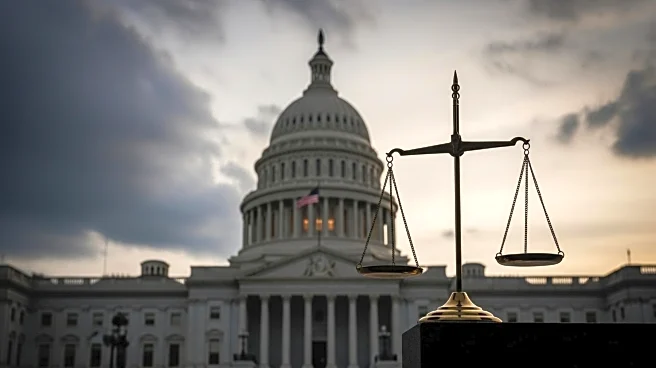What's Happening?
The federal government shutdown has entered its second week, with no clear resolution in sight. The shutdown has led to halted tours at the Capitol, closed doors in the House, and repeated failed votes in the Senate to reopen the government. President Trump has threatened to mass fire federal workers and refuse back pay. The impasse centers around negotiations for preserving health care subsidies, with Republicans and Democrats meeting privately to find a solution. The shutdown has caused disruptions, including missed paychecks for military personnel and federal employees, delayed flights, and interrupted federal programs. Two competing bills from Republicans and Democrats have failed in the Senate, with each party holding firm on their positions.
Why It's Important?
The ongoing shutdown has significant implications for U.S. politics and society. It affects millions of Americans who rely on federal services and employees who face financial uncertainty. The core issue revolves around health care subsidies, which are crucial for maintaining affordable insurance under the Affordable Care Act. The expiration of these subsidies could lead to increased health care costs for millions. The political standoff reflects broader partisan divides, with each side using the shutdown as a strategic tool ahead of the 2026 midterm elections. The outcome of these negotiations could impact public policy and the political landscape significantly.
What's Next?
Negotiations are expected to continue behind closed doors, with lawmakers from both parties seeking a resolution. President Trump has indicated a willingness to negotiate on health care subsidies, but insists on reopening the government first. Various proposals are being discussed, including temporary extensions of subsidies and commitments to address health care issues. The shutdown's resolution will depend on whether either party is willing to compromise. The political stakes are high, with both parties using the situation to bolster their positions ahead of upcoming elections.
Beyond the Headlines
The shutdown highlights deeper issues within U.S. governance, including the use of federal workers as leverage in political disputes. The threat to eliminate guaranteed back pay for federal employees marks a departure from previous shutdowns, raising ethical concerns about the treatment of public servants. The situation underscores the challenges of bipartisan cooperation in addressing critical issues like health care, which have long been contentious in U.S. politics.










